| Listing 1 - 10 of 48 | << page >> |
Sort by
|
Book
ISBN: 1280618779 9786610618774 1402040237 Year: 2005 Publisher: Dordrecht : Springer,
Abstract | Keywords | Export | Availability | Bookmark
 Loading...
Loading...Choose an application
- Reference Manager
- EndNote
- RefWorks (Direct export to RefWorks)
The emergence and widespread use personal computers and network technologies have seen the development of interest in the use of computers to support cooperative work. This volume presents the proceedings of the ninth European conference on Computer Supported Cooperative Work (CSCW). This is a multidisciplinary area that embraces the development of new technologies grounded in actual cooperative practices. These proceedings contain a collection of papers that reflect the variegated research activities in the field. The volume includes papers addressing novel interaction technologies for CSCW systems, new models and architectures for groupware systems, studies of communication and coordination among mobile actors, studies of cooperative work in complex settings, studies of groupware systems in actual use in real-world settings, and theories and techniques to support the development of cooperative applications. The papers present emerging technologies alongside new methods and approaches to the development of this important class of applications. The work in this volume represents the best of the current research and practice within CSCW. The collection of papers presented here will appeal to researchers and practitioners alike, as they combine an understanding of the nature of work with the possibility offered by new technologies.
Teams in the workplace --- Industrial management. --- Data processing --- Business administration --- Business enterprises --- Business management --- Corporate management --- Corporations --- Industrial administration --- Management, Industrial --- Rationalization of industry --- Scientific management --- Management --- Business --- Industrial organization

ISBN: 1280312823 9786610312825 1846281067 1852338350 Year: 2005 Publisher: London : Springer,
Abstract | Keywords | Export | Availability | Bookmark
 Loading...
Loading...Choose an application
- Reference Manager
- EndNote
- RefWorks (Direct export to RefWorks)
Enterprise Modelling (EM) methods are frequently used by entrepreneurs as an analysis tool for describing and redesigning their businesses. The resulting product, an enterprise model, is commonly used as a blueprint for reconstructing organizations and such effort is often a part of business process re-engineering and improvement initiatives. Automating Business Modelling describes different techniques of providing automated support for enterprise modelling methods and introduces universally used approaches. A running example of a business modelling method is included; providing a framework and detailed explanation as to how to construct automated support for modelling, allowing readers to follow the method to create similar support. Suitable for senior undergraduates and postgraduates of Business Studies, Computer Science and Artificial Intelligence, practitioners in the fields of Knowledge Management, Enterprise Modelling and Software Engineering, this book offers insight and know-how to both student and professional.
Industrial management --- Business --- Computer simulation. --- Mathematical models. --- Trade --- Economics --- Management --- Commerce --- Business mathematics --- Quantitative business analysis --- Business administration --- Business enterprises --- Business management --- Corporate management --- Corporations --- Industrial administration --- Management, Industrial --- Rationalization of industry --- Scientific management --- Industrial organization
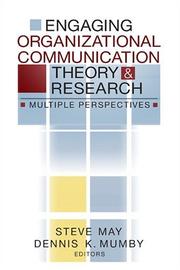
ISBN: 0761928499 0761928480 1322283206 1452222126 9781452222127 1452204535 1452236720 9780761928492 9780761928485 Year: 2005 Publisher: Thousand Oaks, Calif. Sage
Abstract | Keywords | Export | Availability | Bookmark
 Loading...
Loading...Choose an application
- Reference Manager
- EndNote
- RefWorks (Direct export to RefWorks)
The authors present theory emergence & development as an engaged process that occurs through the work of real scholars who are grappling with particular organisational problems & issues.
Organization theory --- Mass communications --- Communication in organizations --- Communication in organizations. --- Industrial management. --- Business administration --- Business enterprises --- Business management --- Corporate management --- Corporations --- Industrial administration --- Management, Industrial --- Rationalization of industry --- Scientific management --- Management --- Business --- Industrial organization --- Organizational communication --- Organization --- E-books
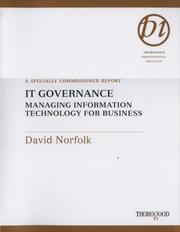
ISBN: 1854183710 9786610233489 1423787129 1280233486 1854184601 Year: 2005 Publisher: London : Thorogood,
Abstract | Keywords | Export | Availability | Bookmark
 Loading...
Loading...Choose an application
- Reference Manager
- EndNote
- RefWorks (Direct export to RefWorks)
Are you aware of the sections of the Companies (Audit, Investigations and Community Enterprise) Act, 2004 affecting IT Governance? This report sets out: what the legislation says and what it means; its impact on the organization as a whole and on the IT group specifically; and how to implement an effective IT governance initiative in your company.
Information technology. --- Information technology --- Industrial management. --- Management. --- Business administration --- Business enterprises --- Business management --- Corporate management --- Corporations --- Industrial administration --- Management, Industrial --- Rationalization of industry --- Scientific management --- Management --- Business --- Industrial organization
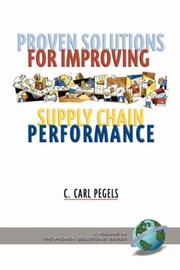
ISBN: 1593113161 159311317X 1607527553 1281362395 9786611362393 1601199694 9781607527558 9781601199690 Year: 2005 Publisher: Greenwich, Conn. : IAP - Information Age Publishing Inc.,
Abstract | Keywords | Export | Availability | Bookmark
 Loading...
Loading...Choose an application
- Reference Manager
- EndNote
- RefWorks (Direct export to RefWorks)
Business logistics. --- Industrial management. --- Engineering --- Industrial Engineering --- Business logistics --- Industrial management --- Business administration --- Business enterprises --- Business management --- Corporate management --- Corporations --- Industrial administration --- Management, Industrial --- Rationalization of industry --- Scientific management --- Management --- Business --- Industrial organization --- Supply chain management --- Logistics --- E-books

ISBN: 1281187100 9786611187101 1605571091 1435617010 9781435617018 1411638026 9781411638020 Year: 2005 Publisher: Grand Rapids, OH : Richard Stowell Enterprises,
Abstract | Keywords | Export | Availability | Bookmark
 Loading...
Loading...Choose an application
- Reference Manager
- EndNote
- RefWorks (Direct export to RefWorks)
Learning the lessons taught in this book will maximize your and your product's exposure and sales without spending a dime on advertising. This book pits brains against brawn and forces you to think outside the traditional marketing sphere. Guerilla marketing allows you to outsmart your competition, without having to out spend them. Discover pin-pointing strategies to jump-start or revitalize your sales numbers using guerilla marketing concepts.
Marketing. --- Industrial management. --- Business administration --- Business enterprises --- Business management --- Corporate management --- Corporations --- Industrial administration --- Management, Industrial --- Rationalization of industry --- Scientific management --- Management --- Business --- Industrial organization --- Consumer goods --- Domestic marketing --- Retail marketing --- Retail trade --- Industrial management --- Aftermarkets --- Selling --- Marketing

ISBN: 1280190361 9786610190362 0387238433 0387237941 1441936610 Year: 2005 Publisher: New York, N.Y. : Springer,
Abstract | Keywords | Export | Availability | Bookmark
 Loading...
Loading...Choose an application
- Reference Manager
- EndNote
- RefWorks (Direct export to RefWorks)
RandD is the single most important investment for any company or any society. Its ultimate product is an innovation. Innovations are on the other side the major propeller for the respective (socio-) economic development of the very company or society. Management and management science mainly treat RandD and innovations as costs or budgets to be managed, an approach that is in stark contrast to their overwhelming importance. This and the very fact that RandD and innovation success is a by necessity a-priori unknown and thus uncertain ex-post definition is not at all being respected properly up to now. In The Innovation Game La Corre and Mishchke consider RandD and innovation as an inherently risky investment which should be profitable, at least on average. Applying a statistical filter model, the authors are able to describe the RandD- and the innovation-process in great detail, almost like a production process. As a metaphor, the book tries to describe it like the control laws of the "distillery for inno-success knowledge". The corresponding control model and the derived inno-management rules do allow the authors to compute and optimize the respective success-chances, the appropriate processes and the suited organizational structures of a targeted "inno-success distillery", the innovation-/RandD-pipeline, in an unprecedented way.
Technological innovations --- Research --- Research, Industrial --- Management. --- Economic aspects. --- Research management --- Economic policy. --- R & D/Technology Policy. --- Innovation/Technology Management. --- Administration --- Industrial relations --- Organization --- Economic nationalism --- Economic planning --- National planning --- State planning --- Economics --- Planning --- National security --- Social policy --- Industrial management. --- Business administration --- Business enterprises --- Business management --- Corporate management --- Corporations --- Industrial administration --- Management, Industrial --- Rationalization of industry --- Scientific management --- Management --- Business --- Industrial organization
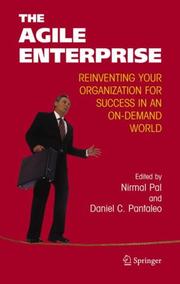
ISBN: 1280234164 9786610234165 0387250786 0387250778 Year: 2005 Publisher: New York : Springer,
Abstract | Keywords | Export | Availability | Bookmark
 Loading...
Loading...Choose an application
- Reference Manager
- EndNote
- RefWorks (Direct export to RefWorks)
"More than ever, our success -- whether in business, government or academe – depends on our ability to see change and respond to it quickly. The bar has been raised once again. This time, it's agility. Information technology and business strategies must not only be aligned, they must be adaptable. Pal, Pantaleo and colleagues provide us with a cogent picture of this new order, and offer practical advice on what to do about it." Buzz Waterhouse, Former Chairman, President, and CEO, the Reynolds and Reynolds Company "Increasing competitive pressures, continuous change in market forces, and rapid introduction of new technology have created a new, more challenging dynamic in business today. In order to succeed, and even survive, in this environment, organizations must adopt new business models that rely on anticipation, speed, and flexibility to create competitive advantage. The eBRC has brought together thought leaders from academia, industry, and government to provide a comprehensive analysis of the issues and opportunities facing organizations as they make this transformation. The Agile Enterprise is an invaluable resource, offering both strategic and tactical insights for leaders as they create adaptive organizations." Kirk Rothrock, President and CEO, CompBenefits "Forget the past, the Agile Enterprise examines the future of business and government in which the ability to change with speed defines success. Frameworks and examples abound on key topics such as business process automation, offshore outsourcing, innovation management, services building blocks, security and privacy, as well as the DNA of organizational agility." James C. Spohrer, Director, Almaden Services Research, IBM "The Agile Enterprise anticipates perfectly 21st century business requirements. Business must move fast and adapt to anticipated and unanticipated events and conditions. The book provides a wake-up call for anyone who thinks strategically about where business models and processes are heading. Ignore the call at your peril; take the call and re-think the velocity and trajectory of your business. Nirmal Pal and Dan Pantaleo have assembled a ton of valuable insights, recommendations and best practices into one volume that really gets it: the velocity of business change is accelerating and the trajectories are traditional and non-traditional." Stephen J. Andriole, Ph.D., Thomas G. Labrecque Professor of Business Technology, Villanova University and Former Senior Vice President for Technology Strategy & Chief Technology Officer of Safeguard Scientifics, Inc. and CIGNA Corporation "Pal and Pantaleo have masterfully assembled the newest ideas and recommendations from a collage of government, business and academic thought leaders into a body of work that provides executives with an excellent roadmap for evolving their enterprises into that fittest of all organizational species – the Agile Enterprise. A nice balance between theoretical and practical analyses – with lots of anecdotes, real-life examples and useful tools for setting and achieving goals focused on adaptability, innovation and agility. A great addition to any executive’s arsenal of information for success." Tom Crawford, President & CEO, Cyber-Ark Software, Inc.
Organizational effectiveness. --- Strategic planning. --- Industrial management --- Technological innovations. --- Goal setting (Strategic planning) --- Planning, Strategic --- Strategic intent (Strategic planning) --- Strategic management --- Planning --- Business planning --- Management --- Organization --- Business administration --- Business enterprises --- Business management --- Corporate management --- Corporations --- Industrial administration --- Management, Industrial --- Rationalization of industry --- Scientific management --- Business --- Industrial organization
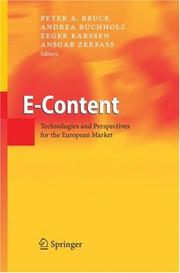
ISBN: 1280413247 9786610413249 354026387X 354025093X 3642064159 Year: 2005 Publisher: Berlin ; New York : Springer,
Abstract | Keywords | Export | Availability | Bookmark
 Loading...
Loading...Choose an application
- Reference Manager
- EndNote
- RefWorks (Direct export to RefWorks)
Technologies develop rapidly and reach hurricane levels of velocity but quality E-Content and innovative applications lag behind. This book addresses the question how content industries change within a digital environment and what role information and communication technologies play in transforming the competitive landscape. The authors argue that post-industrial societies tend to pay substantial amounts for equipment and gadgets but invest far too little in the quality of the content. As a result, much effort is and has to be spent on the enhancement of E-Content. The contributions give an elaborate overview of: - the specifics, challenges and prospects of content in the network economy; - market developments of digital media services; - paid content business models; - impacts on scientific publishing; - developments in the field of E-Learning; - the interplay between technology and content with the example of interactive digital TV; - the mobile games market; - emerging new cross media markets; - the need to enhance the usability of websites and mobile applications; - how digital applications might be used to capture and store our personal experiences. A final chapter shows the prospects of the European E-Content market and gives an overview of valuable initiatives and resources dealing with the topic of E-Content.
Computer network resources --- Internet industry --- Computer industry --- Internet resources --- Remote access electronic resources --- Remote electronic resources --- Resources, Computer network --- Electronic information resources --- Uniform Resource Identifiers --- Industrial management. --- Management. --- Media Management. --- Innovation/Technology Management. --- Administration --- Industrial relations --- Organization --- Business administration --- Business enterprises --- Business management --- Corporate management --- Corporations --- Industrial administration --- Management, Industrial --- Rationalization of industry --- Scientific management --- Management --- Business --- Industrial organization
Book
ISBN: 1280627530 9786610627530 3540272518 Year: 2005 Publisher: Berlin : Springer,
Abstract | Keywords | Export | Availability | Bookmark
 Loading...
Loading...Choose an application
- Reference Manager
- EndNote
- RefWorks (Direct export to RefWorks)
Introduction Closing supply chains refers to taking care of items once they are no longer desired or can no longer be used by their user. Smart management of closed-loop supply chains means profitable recovery of value from these items (products, functional components, materials or packaging). The company closing the supply chain may be the original equipment manuf- turer (OEM), a distribution partner or a third party not involved in the f- ward distribution. In recent years, the management of closed-loop supply chains has gained importance because of increased legislation on producer respon- bility, requiring companies to take back products from customers and to organize for proper recovery and disposal. This legislation is partially due to increased awareness of environmental issues. However, smart com- nies have also understood that returned products often contain lots of value to be recovered. They manage closed-loop supply chains simply because it is a profitable business proposition.
Business logistics. --- Industrial management. --- Business administration --- Business enterprises --- Business management --- Corporate management --- Corporations --- Industrial administration --- Management, Industrial --- Rationalization of industry --- Scientific management --- Management --- Business --- Industrial organization --- Supply chain management --- Industrial management --- Logistics --- Production management. --- Engineering economy. --- Management. --- Operations Management. --- Engineering Economics, Organization, Logistics, Marketing. --- Economy, Engineering --- Engineering economics --- Industrial engineering --- Manufacturing management --- Administration --- Industrial relations --- Organization --- Engineering economics.
| Listing 1 - 10 of 48 | << page >> |
Sort by
|

 Search
Search Feedback
Feedback About UniCat
About UniCat  Help
Help News
News